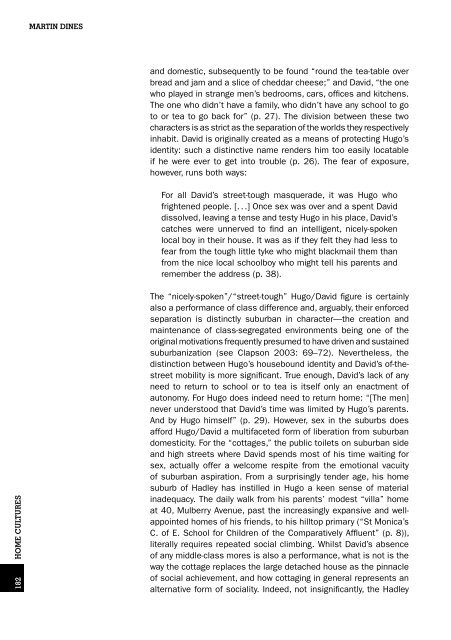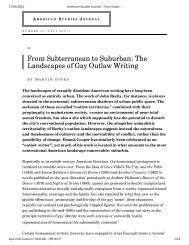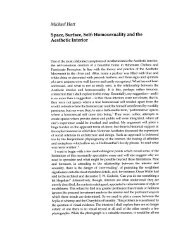sacrilege in the sitting room: contesting suburban ... - Fritz Haeg
sacrilege in the sitting room: contesting suburban ... - Fritz Haeg
sacrilege in the sitting room: contesting suburban ... - Fritz Haeg
Create successful ePaper yourself
Turn your PDF publications into a flip-book with our unique Google optimized e-Paper software.
HOME CULTURES<br />
182<br />
MARTIN DINES<br />
and domestic, subsequently to be found “round <strong>the</strong> tea-table over<br />
bread and jam and a slice of cheddar cheese;” and David, “<strong>the</strong> one<br />
who played <strong>in</strong> strange men’s bed<strong>room</strong>s, cars, offices and kitchens.<br />
The one who didn’t have a family, who didn’t have any school to go<br />
to or tea to go back for” (p. 27). The division between <strong>the</strong>se two<br />
characters is as strict as <strong>the</strong> separation of <strong>the</strong> worlds <strong>the</strong>y respectively<br />
<strong>in</strong>habit. David is orig<strong>in</strong>ally created as a means of protect<strong>in</strong>g Hugo’s<br />
identity: such a dist<strong>in</strong>ctive name renders him too easily locatable<br />
if he were ever to get <strong>in</strong>to trouble (p. 26). The fear of exposure,<br />
however, runs both ways:<br />
For all David’s street-tough masquerade, it was Hugo who<br />
frightened people. [. . .] Once sex was over and a spent David<br />
dissolved, leav<strong>in</strong>g a tense and testy Hugo <strong>in</strong> his place, David’s<br />
catches were unnerved to f<strong>in</strong>d an <strong>in</strong>telligent, nicely-spoken<br />
local boy <strong>in</strong> <strong>the</strong>ir house. It was as if <strong>the</strong>y felt <strong>the</strong>y had less to<br />
fear from <strong>the</strong> tough little tyke who might blackmail <strong>the</strong>m than<br />
from <strong>the</strong> nice local schoolboy who might tell his parents and<br />
remember <strong>the</strong> address (p. 38).<br />
The “nicely-spoken”/“street-tough” Hugo/David figure is certa<strong>in</strong>ly<br />
also a performance of class difference and, arguably, <strong>the</strong>ir enforced<br />
separation is dist<strong>in</strong>ctly <strong>suburban</strong> <strong>in</strong> character—<strong>the</strong> creation and<br />
ma<strong>in</strong>tenance of class-segregated environments be<strong>in</strong>g one of <strong>the</strong><br />
orig<strong>in</strong>al motivations frequently presumed to have driven and susta<strong>in</strong>ed<br />
<strong>suburban</strong>ization (see Clapson 2003: 69–72). Never<strong>the</strong>less, <strong>the</strong><br />
dist<strong>in</strong>ction between Hugo’s housebound identity and David’s of-<strong>the</strong>street<br />
mobility is more significant. True enough, David’s lack of any<br />
need to return to school or to tea is itself only an enactment of<br />
autonomy. For Hugo does <strong>in</strong>deed need to return home: “[The men]<br />
never understood that David’s time was limited by Hugo’s parents.<br />
And by Hugo himself” (p. 29). However, sex <strong>in</strong> <strong>the</strong> suburbs does<br />
afford Hugo/David a multifaceted form of liberation from <strong>suburban</strong><br />
domesticity. For <strong>the</strong> “cottages,” <strong>the</strong> public toilets on <strong>suburban</strong> side<br />
and high streets where David spends most of his time wait<strong>in</strong>g for<br />
sex, actually offer a welcome respite from <strong>the</strong> emotional vacuity<br />
of <strong>suburban</strong> aspiration. From a surpris<strong>in</strong>gly tender age, his home<br />
suburb of Hadley has <strong>in</strong>stilled <strong>in</strong> Hugo a keen sense of material<br />
<strong>in</strong>adequacy. The daily walk from his parents’ modest “villa” home<br />
at 40, Mulberry Avenue, past <strong>the</strong> <strong>in</strong>creas<strong>in</strong>gly expansive and wellappo<strong>in</strong>ted<br />
homes of his friends, to his hilltop primary (“St Monica’s<br />
C. of E. School for Children of <strong>the</strong> Comparatively Affluent” (p. 8)),<br />
literally requires repeated social climb<strong>in</strong>g. Whilst David’s absence<br />
of any middle-class mores is also a performance, what is not is <strong>the</strong><br />
way <strong>the</strong> cottage replaces <strong>the</strong> large detached house as <strong>the</strong> p<strong>in</strong>nacle<br />
of social achievement, and how cottag<strong>in</strong>g <strong>in</strong> general represents an<br />
alternative form of sociality. Indeed, not <strong>in</strong>significantly, <strong>the</strong> Hadley








